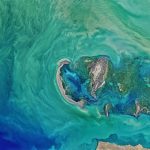 March 29, 2019 11:58 am
Published by Climate Extremes
March 29, 2019 11:58 am
Published by Climate Extremes
Marine heatwaves are becoming longer and more frequent. A global assessment of marine heatwaves has concluded that they have “the capacity to restructure entire ecosystems and disrupt the provision of ecological goods and services in the coming decades".
 March 25, 2019 1:58 pm
Published by Climate Extremes
March 25, 2019 1:58 pm
Published by Climate Extremes
CLEX researchers and colleagues discovered which species are most important in transferring climate change impacts through the ecosystem using a model that simulated the southeast Australian ecosystem through to 2050.
 March 22, 2019 3:52 pm
Published by Climate Extremes
March 22, 2019 3:52 pm
Published by Climate Extremes
A new framework for cyclone jet interaction improve our understanding of how the turbulent atmosphere is organised in coherent motions via the jet stream
 March 8, 2019 2:21 pm
Published by Climate Extremes
March 8, 2019 2:21 pm
Published by Climate Extremes
CLEX researchers evaluate the performance of CORDEX simulations over Australia against gridded observations of temperature and precipitation.
 March 8, 2019 9:27 am
Published by Climate Extremes
March 8, 2019 9:27 am
Published by Climate Extremes
How wet the soil is before a storm can determine the amount of rain that falls. This research also produced some interesting findings for rainfall in Australia.
 March 7, 2019 9:46 am
Published by Climate Extremes
March 7, 2019 9:46 am
Published by Climate Extremes
In her first blog Kim Reid looks at a small part of the future of science. Multimedia figures, technology and open access journals may provide a glimpse of what is to come.
 March 6, 2019 4:23 pm
Published by Climate Extremes
March 6, 2019 4:23 pm
Published by Climate Extremes
New research suggests that the concept of maximum evaporation reported here is a natural attribute of an extensive wet evaporating surface. This provides a fundamental new insight as to how radiation, evaporation and temperature are interlinked.
 March 5, 2019 1:54 pm
Published by Climate Extremes
March 5, 2019 1:54 pm
Published by Climate Extremes
Topography plays a key role in the development of extreme rainfall events in Jakarta, Indonesia. The IOD and MJO play a greater role in these extremes than ENSO.
 March 5, 2019 10:17 am
Published by Climate Extremes
March 5, 2019 10:17 am
Published by Climate Extremes
This research shows accounting for mesophyll conductance in climate models may have important implications for carbon and water fluxes in boreal regions.
 March 5, 2019 8:09 am
Published by Climate Extremes
March 5, 2019 8:09 am
Published by Climate Extremes
The increase in frequency and intensity of ocean heatwaves over the past 30 years has had profound impacts on certain marine ecosystems and significantly impacted the industries that depend on them. According to new research in Nature Climate Change, marine heatwaves are now a clear and present threat to global biodiversity.










